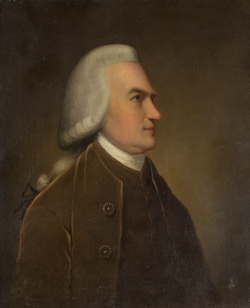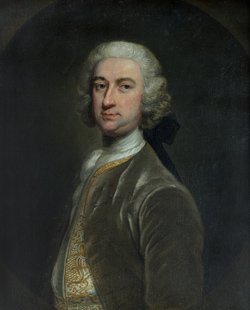“The only two Gentlemen of the Town who have visited Lieut. Hawkshaw”
That undated document is also in the Thomas Gage Papers at the Clements Library. It says:
Mr.Gilbert Deblois (shown above, in a portrait made by John Singleton Copley a few years later) was a Loyalist merchant. Evidently Col. Walcott didn’t know him well enough to distinguish him from his brother Lewis.LewisGilbt. De Blois & Doctor Byles who were the only two Gentlemen of the Town who have visited Lieut. Hawkshaw since his being brought into Boston, both declare That,
Neither of Them had any the least Conversation with Lt. Hawkshaw upon the Subject of the affair of Wednesday last the 19th. April; & particularly that They nor Either of them ever heard Lt. Hawkshaw say that the King’s Troops had fired first upon the Country People
Gibert Deblois
Mather Byles
The Rev. Dr. Mather Byles was one of the few Congregationalist ministers in Massachusetts siding with the royal government.
These two witnesses were thus inclined to be more friendly to the army and Gen. Thomas Gage than the average Bostonian. But what Patriot would be admitted to Lt. Hawkshaw’s sick chamber?
In an article for Common-place, Edward M. Griffin asked, “Could anyone believe that when Byles and Deblois had visited him [Hawkshaw] they simply passed the time in pleasant conversation without ever discussing the previous week’s armed confrontation between British troops and rebellious locals?”
I think the state of Hawkshaw’s health does make that plausible. He probably felt weak, had trouble speaking, and expected to die soon. I can imagine a scenario in which the lieutenant was renting a room from Deblois, who could think of nothing more helpful than bringing in the Rev. Dr. Byles to provide religious comfort. And the men kept their conversation brief.
When Edmund Quincy wrote that Hawkshaw “Call’d Several Credible persons to him & told ’em as a dying man…that the first Action of ye Whole at L. was done by the Kings troops,” he said that he’d heard that from “Capt. [John] Erving, at his house yesterday,” and that Erving said it was “proved to him at ye No: End yesterday to be real.”
The British mercantile economy ran passing on rumors like that because hard information was so hard to come by. In this case, Quincy or Erving or both were probably sucked in by wishful thinking. Or perhaps some Patriot propagandist thought it would be effective to attribute a confession to an officer on his deathbed.
So far as I can tell, no newspapers or other sources outside Boston picked up on the rumor about Hawkshaw, though Salem printer Ezekiel Russell did learn about his life-threatening wound. Perhaps the documents that Lt. Col. Walcott collected helped to quash the whispers. Perhaps they were so wispy to start with (who were these “Several Credible persons”?) that they dissipated on their own.
As I wrote before, Lt. Hawkshaw proved more durable. He recovered. In November 1777 he attained the rank of “Captain Lieutenant and Captain” as officers in the 5th moved up because another captain had “died of his wounds.” A year later, Hawkshaw was promoted to full captain in place of Capt. John Gore, the officer he had first spoken to on the evening of 19 April when he was brought back, bleeding, to Boston.









